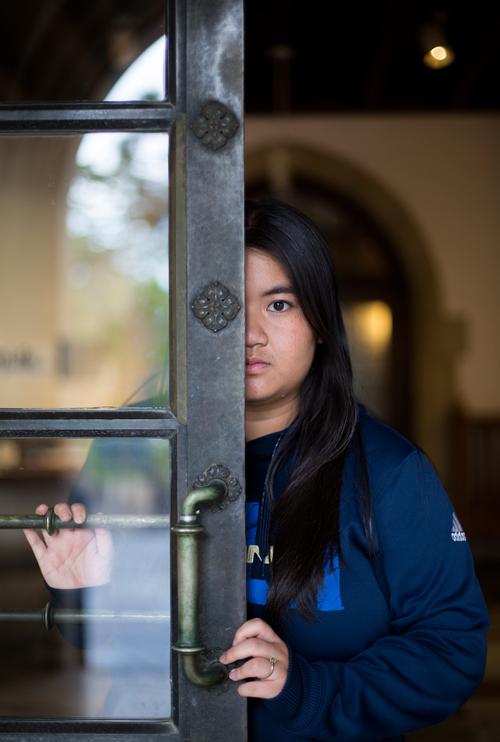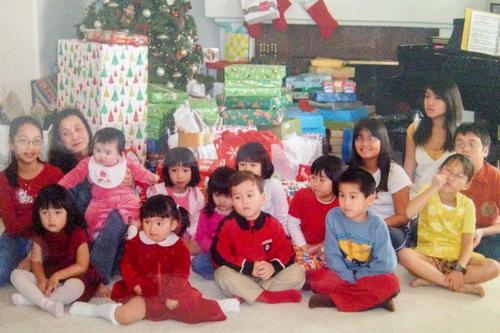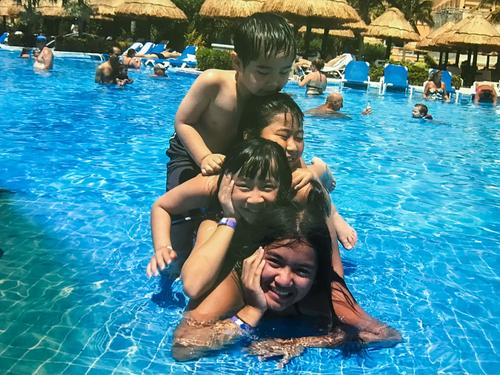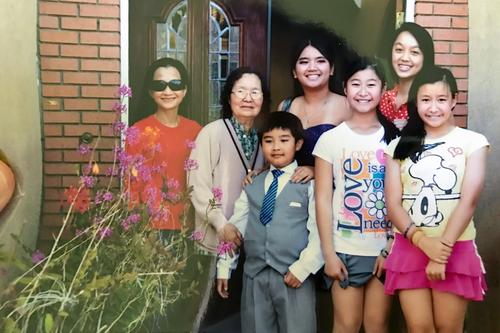

There were few things I hated more than family parties at my house.
I tripped over the dozens of shoes littered in the doorway on my way to the dining room, where the sounds of chatter and chopsticks clicking together echoed through the crowded kitchen.
The kitchen island brimmed with food – steaming fried rice, spring rolls, rice cakes, egg rolls – all ready to be eaten. As I stood there with my best friend, a bowl of food in my hands, an aunt and uncle turned around and told us that we looked like the number 10. Her the tall ‘one,’ me the fat ‘zero’.
I put my bowl down and walked away. I was angry.
I’d yell at them to leave me alone and they would look at me smugly, satisfied that they had successfully goaded and baited me into lashing out. Everything I did was always scrutinized and every word I said was always twisted.
My mother would always scold me afterwards, even if she sympathized with me.
“You’re not supposed to treat the adults that way,” she said. “That’s hỗn. They’re family.”
But real families don’t orchestrate elaborate schemes that result in some of their members having nowhere to live and no money to support themselves.

When I was 3, I moved into that two-story house with my parents, sister, grandma and aunt. My aunt's husband and three kids joined us over the years.
It seemed like a mansion when I first walked up the brick steps. The blank walls and pristine carpets were a canvas to fill with memories and stories. And I did, for 15 years – a mix of good and bad ones. The house was where we held weddings, where we celebrated Christmases and Lunar New Years and birthdays and where I eventually lost my entire family.
The fights and arguments between my parents and the rest of my family had been going on for decades – most of them centered around my sister and me.
“They should go to UCI like their cousin. UCI is the best of the best!”
“Why do they need tutoring, are they dumb?”
“Why are you wasting their time in Girl Scouts? It’s unnecessary.”
We ignored their criticisms of the way we were raised and did everything our parents wanted us to do. We respected them, went to temple and got accepted into UCLA.
I didn’t understand why all of that wasn’t good enough for our extended family, until my mom told me – we were too good and achieved more than our family had wanted us to achieve.
Blood may be thicker than water, but jealousy is stronger still – and it spread easily through our family. Everyone ridiculed my parents for their lack of education and their perceived inability to raise my sister and I.
My parents had put their own college dreams and goals on hold because of my family. Rather than focus on themselves, my mom and dad helped my mom’s aunts, uncles and younger brothers and sisters come to America after the Vietnam War – where they would be able to go to college and have families of their own.
But the family was critical instead of appreciative. Even with all their doubts and disdain, my parents would “win” nearly every competition. My sister and I were the second- and fifth-oldest, respectively, in our generation. Throughout our lives, we would consistently outpace our cousins closest to our ages. And nothing pissed people off more.
They believed my parents were beneath them, and my sister and I should stay there as well. The children of parents with no college education shouldn’t outperform kids raised by educated pharmacists, engineers or doctors.
It just wasn’t done.
But it did happen and the arguments mounted until my grandma, aunt, uncle and cousins moved away in 2013, without saying goodbye. I couldn’t walk into their old bedrooms without being overwhelmed with sadness. The closets where we played hide-and-seek were now empty, the furniture gone with only the silence remaining.
I hadn’t seen the house that empty since I moved in.

“We’re moving,” my mom said. I had been sitting in my dorm room that November night, looking out the window, when my phone rang.
“When?”
“Now. We have a couple days to finish packing before they’re kicking us out.”
My family had just undersold the house without telling my parents, completely out of spite.
They posted the notice from their lawyer on the front door while my parents were at work to let them know they had to move out immediately. No money of the sale would be given to them – nothing to help me with college, my sister with medical school or my parents find a new home.
My parents were strong, though. They put their heads down and packed up 18 years worth of history in a week, found a temporary house with enough space for the four of us and went about their lives. They were stressed, but they didn’t show it. They had to be my rocks, and they were. I got the call on a Monday and helped them move into their new home that weekend. When I saw that moving truck the next morning, I felt my stomach drop. I had thought I was ready to leave, but I wasn’t.
Our rented townhouse was modern and nice, but it didn’t feel right. There wasn’t that stain on the carpet where I spilled paint during a school project. It didn’t have our video games and DVDs cluttering the family room or the dishes from afternoons spent baking piling up in the sink. The little touches made it better – the smells of my mom’s food filling the kitchen, my dad placing pictures of my sister and I on the shelves, the piano at which I spent countless hours practicing being wheeled in.
But I still felt empty.
I had just started college at UCLA and while visits back to Santa Ana would have been easy, I used any excuse I could to avoid going back to an empty house.
My mom knew and she didn’t push me to come home, visiting me in Westwood with my dad instead. But she did push me to go to my grandma’s new house to pay my respects.
Never mind that my grandma was complicit in my parents’ suffering – she stood by while my aunts and uncles belittled them, condoning their actions. My mom told me how my uncle had called her a greedy prostitute for wanting money from the house sale to care for me and my sister. He did that while my grandmother was there, watching in silent approval.
When I’d see her, she’d act as if nothing had happened, she’d hug me and greet me as if she cared for me. And I would hug her and greet her as if I were happy to see her. She showed me her new room, gesturing toward the shelves that were filled with photographs of family events and her grandkids. My sister’s face and my face were nowhere to be seen.
It didn’t matter how much we cared for them or what we did for them. Like my parents, we were just as disposable and easily forgotten. I didn’t trust them or like them, but you don’t cut off phone calls, text messages or visits with almost 40 people without consequence. Instead of just being angry, loneliness entered the cycle.

It alternated between crying myself to sleep while looking at family photos and sitting in the darkness at Janss Steps, frustrated because I felt like things were spiraling out of control.
The hopelessness took a toll on my body – bulimia, anorexia, anxiety, depression. I tried to hide them all. I didn’t want to seem weak. I didn’t want my problems to become anyone else’s. I didn’t want my parents to worry.
I wanted to be the daughter they raised – tough and resilient. Moving on, though, meant letting go. I couldn’t continue being angry at my family without letting it consume me. It also meant trusting people enough for them to fill the void.
I had always been introverted and cautious, but after my family’s betrayal, letting people in became even harder. I had my parents and my sister, but few others could breach my walls.
But they did. Slowly.
Heart-to-heart talks over wine and pizza rolls with my roommates, chatting with my bosses in between work and confiding in my friends on the toughest days pulled me out of my own dark thoughts. They became that family I craved, the people I could rely on.
The moving van was back months later, ready to load up that unpacked boxes and bring them to a new house.
A permanent one.
There was no feeling of dread, no despair and no anger this time. Just relief. A fresh start was a 20-minute drive away.
Walking up the driveway to this new house felt different. It was empty and a bit dusty, the kitchen in need of repair and the living room screaming for new paint.
My mom walked around animatedly pointing at all the different things she wanted to change once she saved up enough money – the tiles she would replace, where she would put the new oven, how she would knock out the divider and put in a kitchen island instead. I hadn’t seen her or my dad so relaxed in years.
And looking out the sunlit window, I couldn’t help but relax alongside them.
It was a home, and it was ours.
Whenever I start missing my old life, I stop by my childhood house – a quick drive by to see what it’s like now.
It doesn’t look the same anymore. I don’t feel the same longing or nostalgia. The things that happened there are faint echoes, no longer prominent stories.
I have nothing tying me down there, and I don’t have to stop. I just keep going.
Now, I go home.